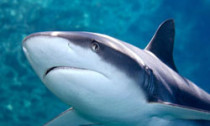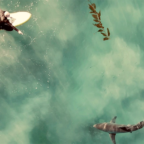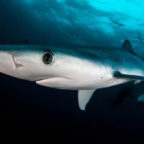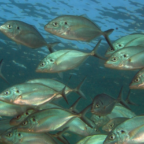
The state government in Queensland, Australia, has for five decades sought to prevent shark attacks through a program that attacks sharks. But new numbers on killed sharks off the coast of some of the world’s best beaches indicate Queensland may be a bit more bloodthirsty than necessary.
During the 2014-2015 fiscal year, the state government helped kill 621 sharks: 251 tiger sharks, 173 whaler sharks, 111 bull sharks, and eight great whites, according to Bill Byrne, Queensland’s fisheries minister. He denies that the program aims to slaughter sharks en masse, but instead seeks to trap those that are considered a direct threat to swimmers and surfers.
Environmental activists, however, argue the program targets sharks that are in some cases endangered, including, notably, the great white. Dolphins, sea turtles, and whales also get caught in the nets, sometimes resulting in their deaths. Moreover, the aggressive use of baits and nets may increase the number of sharks in beach areas, as they are attracted to other animals caught in the nets.
As apex predators, sharks play a key role in maintaining balance in marine ecosystems, and environmental advocates argue that Queensland’s approach to maintaining its shark population may have unintended — and unknown — consequences on the ocean environment. “They need to ask the question what impact they are having on the wider marine environment and is that cost really something they can justify,” Australian Marine Conservation Society spokesman Darren Kindleysides, told the Australian Broadcasting Corporation last year.
In an attempt to address some of concerns of by-catch, the ministry will begin this year to publish information about such incidents when they occur.
Shark attacks, by their grisly, sudden nature, trigger intense public outrage, and Queensland officials argue that their program has been successful in keeping swimmers safe.
But scientists and conservationists argue that such a line of thinking misunderstands the nature of shark attacks. Fatal shark bites are in fact quite rare — even though the danger posed by sharks looms large in the public imagination. In 2014, there were 11 cases of unprovoked shark attacks in Australia, two of which were fatal.
There is no good evidence that using nets and baits even prevents attacks. An analysis of Australian beaches that have installed nets showed 36 attacks before nets were installed and 24 after, only a marginal decrease for a method that Queensland officials are arguing is a near-foolproof method for keeping swimmers safe. That there has only been one fatal Queensland attack may just be indicative of how unusual it is to be killed by a shark at all.
Though shark attacks remain an unlikely cause of death in the water — far more Australians drown every year — the number of attacks have overall increased historically. Scientists attribute the rise to a larger number of people entering water either inhabited by sharks, or previously gone mostly unused by humans. These trends, scientists argue, point to the need for a change in human behavior to avoid areas where sharks may congregate or are feeding.
For his part, Byrne, says he has no plans to alter Queensland’s approach to keeping sharks away from swimmers. “The program is purely designed to catch sharks that are in the vicinity of popular beaches,” he said at a budget hearing this week.















Social Profiles